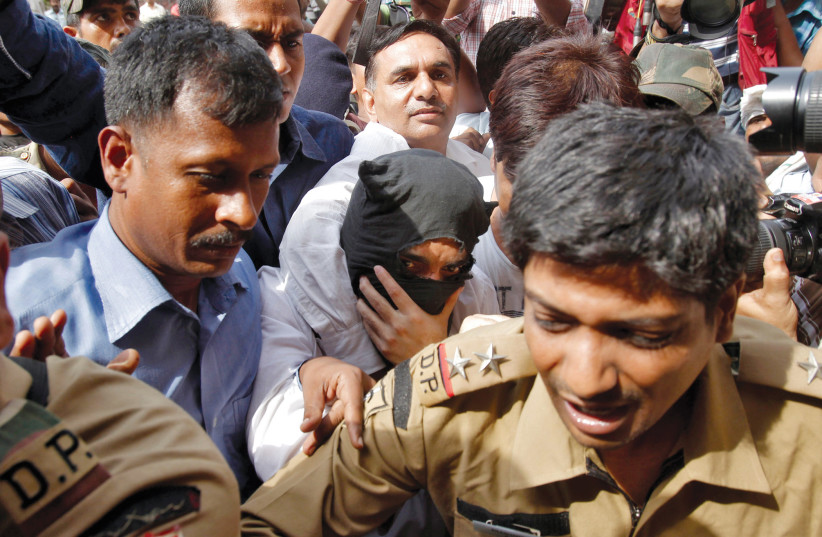14 years ago, on November 26, 2008, the Mumbai terrorist attacks began, a series of attacks conducted by an Islamist terrorist organization from Pakistan, that killed 175 people, including nine terrorists, and left over 300 people wounded.
The terrorist attacks
Ten members of Lashkar-e-Taiba, an Islamist terrorist organization from Pakistan, carried out 12 shooting and bombing attacks throughout Mumbai for four days beginning on November 26.
The first of the attacks occurred at the historic railway the Chhatrapati Shivaji Maharaj Terminus (CSMT). It was attacked by two gunmen, who were later identified as Ismail Khan and Ajmal Kasab, according to multiple news sites.
The attacks started around 9:30 p.m. local time when the two gunmen walked to the passenger hall and opened fire with their AK-47 rifles, killing 58 people and injuring 104.

Vishnu Fattaram Zende, a railway announcer, alerted the passengers to leave the station immediately, which saved many lives.
The gunmen fled the railway, firing at police officers and pedestrians on the street, resulting in eight officers being killed. As they were fleeing, they passed a police station. The police inside knew that they were outgunned by the heavily armed terrorists, so the police officers secured the gates and turned off the lights at the station instead of confronting the terrorists.
The attackers tried to attack Cama Hospital but the hospital staff was notified before so they locked up the whole hospital.
Police Chief Hemant Karkare led a team from the Mumbai Anti-Terrorist Squad in pursuit of the gunmen. Their vehicle reached the gunmen who in return fired at the vehicle, killing all but one officer who was severely wounded. The gunmen then took the police vehicle and later abandoned it and stole a different car.
They ran into a police roadblock which resulted in a gunfight. Khan was killed and Kasab was wounded. A police officer was killed while trying to disarm Kasab after he was wounded. Kasab was then arrested.
Another one of the first attacks was at a popular restaurant and bar in South Mumbai, Leopold Cafe. Two attackers opened fire on the cafe killing ten people, including foreigners.
There were also two explosions in taxis caused by timer bombs during the same time as the two shootings. The first one occurred at Vile Parle, which killed the driver and a passenger. The second one happened at Wadi Bunder, killing three people, including the driver, and injuring about 15 people.
The Taj Mahal Palace Hotel and the Oberoi Trident were also targeted. There were six explosions reported at the Taj Hotel, one in the lobby, two in the elevators, three in the Hotel's restaurant and one at the Oberoi Trident. Firefighters rescued 200 hostages from windows using ladders.
A number of European Parliament Committee on International Trade delegates were guests at the Taj Hotel when it was attacked, but thankfully, none were hurt.
Several residents were held hostage by two attackers at the Mumbai Chabad House, Nariman House. Police evacuated surrounding buildings and exchanged fire with the attackers, wounding one.
Throughout the first day, nine hostages were rescued. NSG commandos from Delhi stormed the Chabad house. After a long day of fighting, one NSG commando was killed as well as the two terrorists. Rabbi Gavriel Holtzberg and his wife Rivka Holtzberg who was six months pregnant were both murdered as well as four other hostages.
"As we reflect on the immeasurable loss of 26/11, let it be a reminder to all of us of our unfinished work in holding accountable the perpetrators of its horrors and of averting future terrorist attacks like it, on any of our people, anywhere,"
Secretary of State Antony Blinken
The aftermath and investigations
In July 2009, Pakistani authorities confirmed that Lashkar-e-Taiba organized the attacks from their camps in Karachi and Thatta. Mumbai police identified 37 suspects, including two Pakistani officers, for allegedly being involved in plotting the attacks.

On October 3, 2009, Pakistani-born, US citizen David Coleman Headly, born Daood Sayed Gilani, was arrested in Chicago. He was found to have made several trips to India prior to the attacks and had gathered videos and pictures, scouting the areas as well as gathering GPS information on behalf of the attackers, according to The Indian Express.
According to CNN, not even ten days later, former Pakistani military doctor and Canadian citizen, Tahawwur Hussain Rana was arrested in Chicago.
March 18, 2010, Headly pleaded guilty to the charges and on January 24, 2013, he was sentenced to 35 years in prison. December 2020, he received a pardon from a Mumbai court in exchange for "detailed testimony regarding Lashkar-e-Taiba and the attacks," according to CNN.
Notable people commemorating the Mumbai terrorist attacks
On early Saturday morning, Secretary of State Antony Blinken wrote on his Twitter, "On the 14th anniversary of the Mumbai terrorist attacks, we stand in solidarity with the people of India and the city of Mumbai. We express our deep condolences to the families and friends of the victims lost in this act of cruelty, including six American citizens."
"As we mark 14 years since the horrific attacks on November 26, we join people in India - and around the world - in mourning the lives lost," Blinken said in a short two-minute clip of a meeting with him and Minister Jaishankar, talking about the attacks. "141 Indians, six Americans. And victims from 15 other countries, from every region of the world. As well as many Mumbaikars, Americans and others wounded - with scars visible and invisible. We stand in solidarity with the people of India and all nations that lost people on that day.
"But we must do more than mourn. We have a responsibility to the victims and people everywhere, to bring to justice the perpetrators of the Mumbai attacks, including their masterminds. That's what the United States has been working to do, together with India and other partners, for the last 14 years. Because when we allow the architects of these attacks to go unpunished, we send a message to terrorists everywhere that their heinous crimes will be tolerated. Many members of the Security Council, including the United States, have adopted our own sanctions against the terrorists behind these attacks.
"But our accountability efforts are more effective when we act together, which is why we've worked with India to put forward nominations to designate several terrorists through the UN 1267 Committee. All relevant parties should support these designations; no nation should stand in their way. Beyond ensuring full accountability for 26/11, we also have a responsibility to prevent future attacks like it. That requires addressing new and emerging threats, such as terrorists' increasing abuse of technologies and the Internet to finance and plan attacks, store assets and radicalize and recruit members.
"The United States is working with the private sector to address these vulnerabilities - from getting financial technology companies to enhance and enforce policies aimed at preventing their illicit use - to helping platforms ensure they're not hosting terrorist content and spreading hate," he continues. "But we can't do it alone and we're ready to work with all governments, multilateral bodies and companies in this effort."
"As we reflect on the immeasurable loss of 26/11, let it be a reminder to all of us of our unfinished work in holding accountable the perpetrators of its horrors and of averting future terrorist attacks like it, on any of our people, anywhere," he wrapped up.
"On the anniversary of 26/11 Mumbai terror attacks, the nation remembers with gratitude all those we lost," Indian President Rashtrapati Bhavan wrote on her Twitter. "We share the enduring pain of their loved ones and families. Nation pay homage to the security personnel who fought valiantly and made supreme sacrifice in the line of duty."
India's External Affairs Minister Dr. S. Jaishankar, remembering the victims, wrote on his Twitter, "Terrorism threatens humanity. Today on 26/11, the world joins India in remembering its victims. Those who planned and oversaw this attack must be brought to justice. We owe this to every victim of terrorism around the world."
"On November 26, 2008, 10 terrorists carried out the horrific Mumbai attacks murdering 166 people and wounding 293," StandWithUs wrote on Twitter. "14 years later we remember the victims. Our thoughts are with all those who were affected by this despicable act of evil. Today, we stand in solidarity with India."
